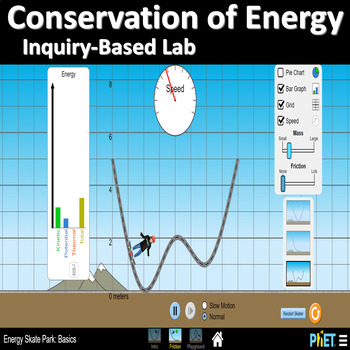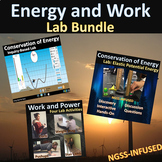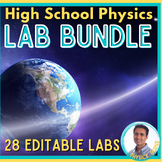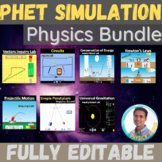Conservation of Energy Inquiry Lab (Phet Simulation) | Physics
- Zip
- Google Apps™

What educators are saying
Also included in
- Here are my THREE favorite labs for Energy and Work. Each of these labs leaves my students excited to learn physics through making experiments, discussing, and moving their bodies. Every year these are the labs I provide to my students who often tell me that physics has become their new favorite claPrice $11.99Original Price $15.85Save $3.86
- Full High School Physics Lab Curriculum. Every lab is editable, so you can tweak things to fit your classroom perfectly. Each of these labs requires only basic materials.Here are all the labs that I do with my Regular, Honors, and AP Students. Each lab comes with worksheets that are differentiated dPrice $99.99Original Price $145.67Save $45.68
- These are 10 simple inquiry-based labs that I love to give students as an intro to different physics chapters. Students will figure out for themselves conceptual problems in different chapters. They will get the basic idea of the physical laws of each chapter while discovering mind-blowing conceptsPrice $29.99Original Price $39.62Save $9.63
Description
This is a simple inquiry-based lab that I love to give students as an intro to Energy and Work. Students will figure out for themselves conceptual problems involving Conservation of Energy. They will get a basic idea of how Gravitational Potential Energy and Kinetic Energy work while discovering mind-blowing concepts. Lastly, the last page of the lab also gives students an opportunity to create their own skate park, which they love, and they get to learn more through creating and playing. Everything is fully editable.
Students will:
- Learn through play
- Have guided questions to direct learning
- Discuss and Hypothesize
- Come up with Conclusions
- Be a part of real-world applications for Energy
______________________________________________________________________________________________
Save over 20% and Buy The Phet Bundle
Phet Lab Bundle
Save over 20% and Buy The Energy and Work Lab Bundle
Lesson Plan Bundle
Lesson Plan Bundle: Energy and Work
________________________________________________________________________________________
Check out my Youtube Channel, Facebook Group, and Follow my Store :)
If this product could really benefit your classroom, but you are not in a good financial situation to buy the product, please contact me and I will give you the product for free, no questions asked. Raymondburnseducator@gmail.com





